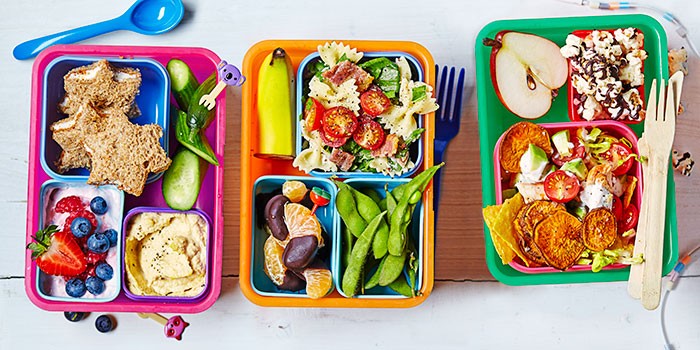Last weekend Edith asked me if I could bake with her and as it’s absolutely, unequivocally preferable to the absolute hell that is playing dolls, I said yes. We had a blast – to be fair I love a good baking sesh. We made flapjacks and a really yummy chocolate cake using a Betty Crocker mix. Afterwards we had a few nibbles and then I cut the rest up and popped them away for taking in lunchboxes – fairly basic weekend vibes. I talk about making your own sweet treats in my book (which you can buy here!) and how it isn’t just fun to do with your kids but can save you a fortune in buying mini cakes/biscuits and the like. I happened to mention this on my instagram stories and received an influx of messages from people telling me that they wouldn’t be allowed to send these kinds of things into school because their school didn’t allow any cakes, sweet treats, biscuits etc or because any homemade item would have to come with an ingredients list so the school could work out whether there was too much sugar or fat in the item.
Now let me just say… what in the fuckery is this? Firstly, if there was an allergy risk cited as a reason, I would be allll the way behind it. One hundred percent because it’s important that children with allergies are kept safe at school, but fat content? Sugar bans? Nahh. That’s some nonsense there. Which is exactly what I took to my stories to say and the horror stories from parents (and a lot of teachers) that I got in response were enough to make my blood boil. Children who had special needs being told their ‘safe’ food was ‘bad’ and they couldn’t bring it again without a doctors note, children having food confiscated and drinks tipped away leaving them to get dehydrated because they wouldn’t drink water, foods being referred to as ‘illegal’ foods if they didn’t fit the policy… I mean, unless you’re sending your kid in with a has brownie, I’m pretty sure illegal isn’t the correct term…
It wasn’t just the foods you might think of either, we’re not just talking cakes and sweets, we’re talking cereal bars, yoghurts with biscuits in, biscuits, chocolate coated rice cakes, children’s snacks like yoghurts or winders, dried fruit because it had to be fresh fruit, crisp bans, bans for foods over certain calorie counts. I was told by some parents that when policies were broken in their schools, children had food confiscated (with no replacement offered) and the food was either handed to the parents at the end of the day with a note to say it wasn’t allowed or in some cases, children would have stickers stuck on their lunch boxes or their person that informed parents they had a ‘bad’ item. the same principals applied to flavoured water or no sugar squash.
There are just so many things wrong with all of this that I struggle to know where to begin. It’s absolutely not to slate schools, this comes from a government directive that schools really do have little say in following, although there are a lot that appear to overlook it in day to day practice. If we’re looking at this objectively, I think we can all agree that penalising a child by removing their food is wrong, yes? That seems like a good place to start. It’s a HUGE welfare issue, and if my child came home to tell me they were hungry because someone took their food due to a school policy, I would be raging. Let’s dig a bit deeper here though, what if that is the ONLY food that child will be given that day because their parents are struggling but they don’t qualify for free school dinners? This isn’t an unlikely scenario in a post covid, austerity battered society. From a moral perspective, it’s shameful.
Whilst we’re on the topic of financial burden, unless you’re paying for that child’s lunch, what right do you have to tell the parent what to buy or not buy? I’d venture none. I’m actually a fan of suggestions – as long as they are that. Perhaps there will be something on a list of suggested packed lunch ideas that someone didn’t think of, perhaps it will give someone a nudge to try something different. Suggestions can’t hurt, but rules and regulations absolutely can. I have spoken to countless SEN parents over the last couple of days about this and their responses have ranged from their children being told one of their food items is ‘bad’ and therefore they will no longer eat it when it’s incredibly different to get them to eat a lot of foods already to the parents who are worried that their child is being further singled out because they are given certain exceptions to the rules.
Finally, let’s look at the language here. “Bad”, “illegal”, “unhealthy” – all so stigmatising and, ultimately, wrong. No food is bad, food doesn’t have a moral value, so it can’t be bad. I hate it when the kids have had a lesson and they come home grouping foods as good and bad. Nope. No. Just, no. It’s incorrect. “Illegal” I’m pretty sure we have already covered… I mean, is it? Nope. As for “unhealthy” this is one that really sticks in me, because we force this narrative that “health” is something we can control, but it isn’t. Dr Natasha Larmie talks a lot about this on her channels (@FatDoctorUK) but “healthy” is so much more than how much we move our bodies and what nutritional value we add in there – and we don’t teach that. You couldn’t live on a diet of broccoli alone, even though it’s often referred to as a good, healthy food. We need to have balance, and THAT is what we need to be instilling in our children. Not a fear of food groups.
As if all of that wasn’t enough, you only have to have a quick gander at the food that is often offered for school dinners, providing your children will eat the veg or main part to the meal that is deemed nutritional (Edith wouldn’t which is why we switched to packed lunches) and ask yourself whether or not the policy seems fair. Sponge cake with custard anyone?




